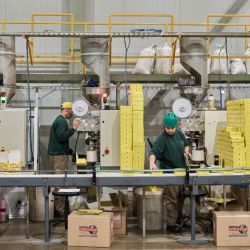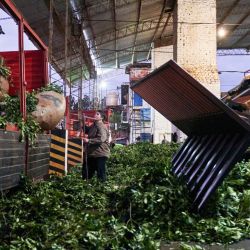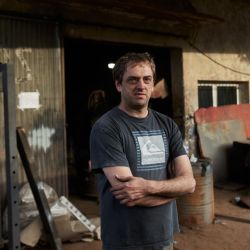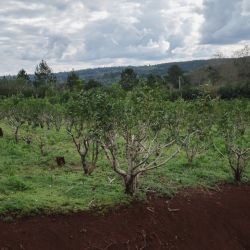Liliana Bayura wrung her yellow-gloved hands as her husband hacked at dense green plants on their farm in the hills of Misiones, a lush Argentine province nestled between Brazil and Paraguay.
With each swing of his machete, the value of their crop slipped further.
They fetched 180 Argentine pesos – about 13 cents – that morning for each kilogramme of leaves that will eventually become yerba mate, the popular caffeinated beverage most Argentines sip daily and that football star Lionel Messi turned into a global symbol of the nation.
That was down 20 pesos from the day prior, and even more from the 250 they typically earned in December 2023, when Javier Milei became President.
In a sharp break from decades of state intervention, the La Libertad Avanza leader has scrapped thousands of price controls and regulations that both cradled and hamstrung Argentine businesses. Ten days into his term, he curbed the price-setting of powers of the national yerba mate regulatory body known as Instituto Nacional de la Yerba Mate (INYM), and later eliminated cost freezes at the supermarket.
The crusade has won Milei cheers from investors as Argentina’s long-beleaguered economy stabilises and inflation cools from a peak near 300 percent. It’s also turned him into an international outlier: amid a global trade war in which even the staunchest defenders of free commerce are hiking tariffs, he’s ripping away support for his nation’s most beloved industries.
Argentines have seen the inflation-adjusted cost of their favourite drink, sold under brands like Playadito, Taragüi and Cruz de Malta, plummet. But the transition has been brutal for sectors long propped up by the nation’s hyperprotectionism.
Two years into Milei’s “shock therapy” regimen, Bayura and many of the 10,000 yerba farmers who make their living in the brick-red soils of Misiones and neighbouring Corrientes are barely hanging on.
“They knocked everything to the floor,” Bayura, 43, said as her 11-year-old daughter played with a litter of puppies at her feet. “Before, even if things were rough, you could still fix up the truck, buy tyres, all that. Now, we’re going to the tyre shop to see if there’s a used one just to keep going.”
“This is our only income,” she said. “If we stop, we don’t eat.”
Despite the pain his changes have caused, many in the province that backed Milei in 2023 are sticking by the president. The question is whether they will remain behind him in crucial midterm elections in October.
Mate meets the market
Like many in Los Helechos, a town of 3,000 people in the heart of Misiones, Bayura’s husband is not the first yerba mate farmer in his family. His parents grew it on the same hilly farm that stretches around their single-floor cottage.
Farmers from the area have in the past wielded such power that they helped force the creation of INYM in 2002, after months-long protests in which they blocked roads with tractors.
“The regulation for that law was drafted here in Misiones,” said Hugo Sand, 67, a grower who helped organise the demonstrations. “Usually, these are done in Buenos Aires for national laws, but that’s how much influence we had. We told the government we weren’t going there anymore. They had to come to us.”
Since its establishment, INYM has convened farmworkers, federal government officials and other industry representatives twice annually to set minimum prices for fresh and dry yerba leaves.
Milei has long argued that such policies create distortions that eventually destabilise the economy and hurt those they are trying to protect.
Upon taking office, he eradicated those powers as part of a sweeping overhaul of the Argentine state. The self-described anarcho-capitalist modified or eliminated more than 670 regulations over his first year in office, according to the Cato Institute, including rules that benefited Argentina’s state-owned airline and the postal service.
Even with controls, prices were still subject to some market forces through under-the-table deals.
In periods of oversupply, dryers – the next step in the production line from growers – would sign checks for the official leaf price, and farmers would slip them the difference in cash, several growers said. When INYM’s price was too low, the dryers paid up, said Enrique Urrutia, a historic tea and yerba mate maker in the city of Oberá.
Milei turned pricing fully over to the market, and the results have been drastic.
At the start of the first harvest after his deregulation, in March 2024, prices peaked near 400 pesos per kilo – above the previous minimum. They plunged to about 260 pesos by this July, according to estimates from Cristián Klingbeil, a former farmer in Oberá who surveys growers. Prices can vary by region and dryer, but over the same period, cumulative inflation neared 100 percent.
Part of the freefall is a result of surging production that coincided with Milei's changes.
Farmers harvested 1.1 million tons of yerba last year, the highest total on record and a 27 percent jump from 2023, according to INYM data. But unlike soy or beef exports that power Argentina’s economy, the bulk of yerba mate consumption is domestic. And demand is still slightly below levels from when Milei took office, according to the body.
This year’s harvest is down 20 percent compared to the same period in 2024, as some growers scale back in hopes prices will improve in the future. But the pressures have pushed others out of the industry altogether.
“When I used to go to my grandfather’s farm as a kid, that was my joy. Harvesting yerba, riding the tractor,” Klingbeil said while installing a semitruck’s cooling unit parked outside his childhood home.
Not long ago, he quit farming to work for his father’s auto repair shop. “The numbers just didn’t add up,” he said.
‘Mercy of God’
Argentine growers have been here before. In 1991, president Carlos Menem abolished the price-setting body that previously oversaw the yerba mate industry. Over the next decade, a surplus sent prices spiralling downward and kicked off the protests that eventually led to INYM’s creation.
The first test of Milei’s approach to yerba mate and the economy overall will come in October, when Argentines vote in midterm elections that could reshape the lower house Chamber of Deputies and Senate.
His deregulation czar, Federico Sturzenegger, has argued that the changes have paid off for Argentines.
“Do you know how much the price of yerba fell in real terms? Forty percent,” Sturzenegger said in a recent podcast interview. “In Misiones, some growers sort of felt that. But on the other side, there are 47 million Argentines.”
Major tractor protests so far haven’t materialised, at least not to the scale of those from decades ago. And while some locals have grown wary of Milei, they’re still far angrier with the governments that came before him and left Argentina in a state of economic ruin.
“We were exhausted,” said Viviana Mielnikow, 51. Her father farms yerba, and she was among the 57 percent of Misiones voters who backed Milei in 2023. “Sometimes I get angry and ask myself, ‘Why did I vote for him?’ But they can’t fix everything in so little time.”
Third-generation grower Ygor Sobol is trying to adapt to the new landscape.
This year, he sold his tractor and harvesting tools to focus on the yerba mate brand he launched shortly before Milei won. He named it León, after his uncle, a farmer and organiser who was disappeared during Argentina’s 1976-1983 military dictatorship.
That’s also Milei’s nickname, and Sobol is marketing his product toward supporters of the President, even if he’s not among them.
“We needed to sell, and we saw an opportunity,” he said from a lawn chair in his garage, beside a pallet of his product.
“Our problem today, more than anything, doesn’t come from the deregulation itself but from the way it was carried out,” Sobol, 40, added. “I believe the president takes his time and follows protocols when it suits him to develop new economic and political structures. He left us to the mercy of God.”
by Manuela Tobias, Bloomberg





























Comments